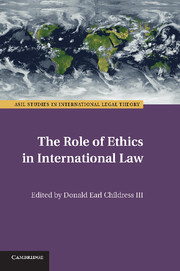Book contents
- Frontmatter
- Contents
- Contributors
- Acknowledgments
- Introduction
- Part one The Role of Ethics in Public International Law
- 1 Moral Reasoning in International Law
- 2 Between Power and Principle
- 3 Jus Cogens: International Law's Higher Ethical Norms
- Part two The Role of Ethics in Private International Law
- Part three Normative and Theoretical Perspectives
- Index
- References
2 - Between Power and Principle
Published online by Cambridge University Press: 05 December 2011
- Frontmatter
- Contents
- Contributors
- Acknowledgments
- Introduction
- Part one The Role of Ethics in Public International Law
- 1 Moral Reasoning in International Law
- 2 Between Power and Principle
- 3 Jus Cogens: International Law's Higher Ethical Norms
- Part two The Role of Ethics in Private International Law
- Part three Normative and Theoretical Perspectives
- Index
- References
Summary
Introduction
One of the most perennially perplexing and challenging questions facing international law scholars is when and why states comply with international law. There are well over 50,000 international treaties currently in force, covering nearly every aspect of international affairs and nearly every facet of state authority. Relatively few of these treaties have what is considered a central enforcement regime. This fact has led some people to challenge the regimes as ineffective and perhaps even meaningless.
In the face of these attacks, international lawyers have worked assiduously to refine, interpret, and apply international law. However, they have not yet done enough to respond to the ever more intense concerns about the field's validity. It is perhaps not surprising, then, that much of the public debate over international law has been polarized and unproductive. Skeptics argue strenuously that international law is mere window dressing. Advocates frequently assume that states abide by their international legal commitments “almost all of the time.” Meanwhile, both sides have remained remarkably ill equipped to predict or explain the real-world impact of international law.
- Type
- Chapter
- Information
- The Role of Ethics in International Law , pp. 52 - 77Publisher: Cambridge University PressPrint publication year: 2011



